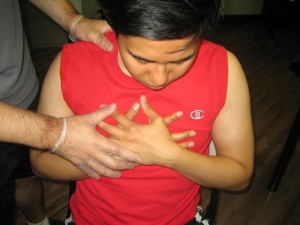Hyperventilation is a disorder in which you unexpectedly start to breathe very fast. Healthy breathing takes place with a healthy balance between inhaling oxygen and exhaling carbon dioxide. When hyperventilating, you disturb this balance by breathing out more than you inhale. This causes a quick drop in carbon dioxide in the body.
A low level of carbon dioxide eventually leads to a tightening of the blood vessels that deliver blood to the brain. This decrease in blood supply to the brain causes symptoms like dizziness and irritation in the fingers. Severe hyperventilation can result in loss of consciousness.
For some individuals, hyperventilation is uncommon, and only occurs as an occasional, frightened reaction to fear, anxiety, or a phobia. For others, this disorder occurs frequently as a typical reaction to emotional states, such as sadness, anxiety, or rage. When hyperventilation is a repeated occurrence, this is identified as hyperventilation syndrome.
Hyperventilation May Also Be Described As:
- Fast (or rapid) shallow breathing
- Excessive breathing
- Breathing speed – quick and deep
General Causes of Hyperventilation
There are several factors that can cause hyperventilation. Most commonly, this disorder results from worry, fear, anxiety, or tension. It regularly takes the form of a panic attack.
Other Causes Might Include:
- Blood loss
- Using of stimulants
- Overdose of pills
- Extreme pain
- Pregnancy
- Lung infection
- Lung diseases (asthma, etc.)
- Heart conditions (heart attack, etc.
When to Get Medical Treatment for Hyperventilation
Hyperventilation can be a severe problem. You should get treatment for hyperventilation when these symptoms take place:
- Fast, shallow breathing
Hyperventilation is a disorder in which you unexpectedly start to breathe very fast. - Hyperventilation that becomes worse over time
- Severe pain
- High fever
- Loss of blood
Treating Hyperventilation
In severe cases of hyperventilation, it is vital to try to remain calm. Having somebody with you to guide you through the incident can be useful. The objective of treatment during an incident is to boost carbon dioxide levels in your body and to slow your breathing speed.
To Assist And Treat Hyperventilation, You Can:
- Practice breathing through clutched lips
- Use a paper bag to breath
- Try to breathe into your stomach rather than your chest
- Cover your lips and try breathing through your nostrils
With your mouth covered, seal your right nostril and inhale through the left. Then swap by sealing the left nostril and inhaling through the right. Replicate this pattern till breathing has gone back to normal.
If you have hyperventilation disorder, you will need to determine what is causing it. If you experience nervousness or stress, you might want to see a psychologist to help you recognize and treat your disorder. Practicing stress reduction methods will assist you to control your disorder.

